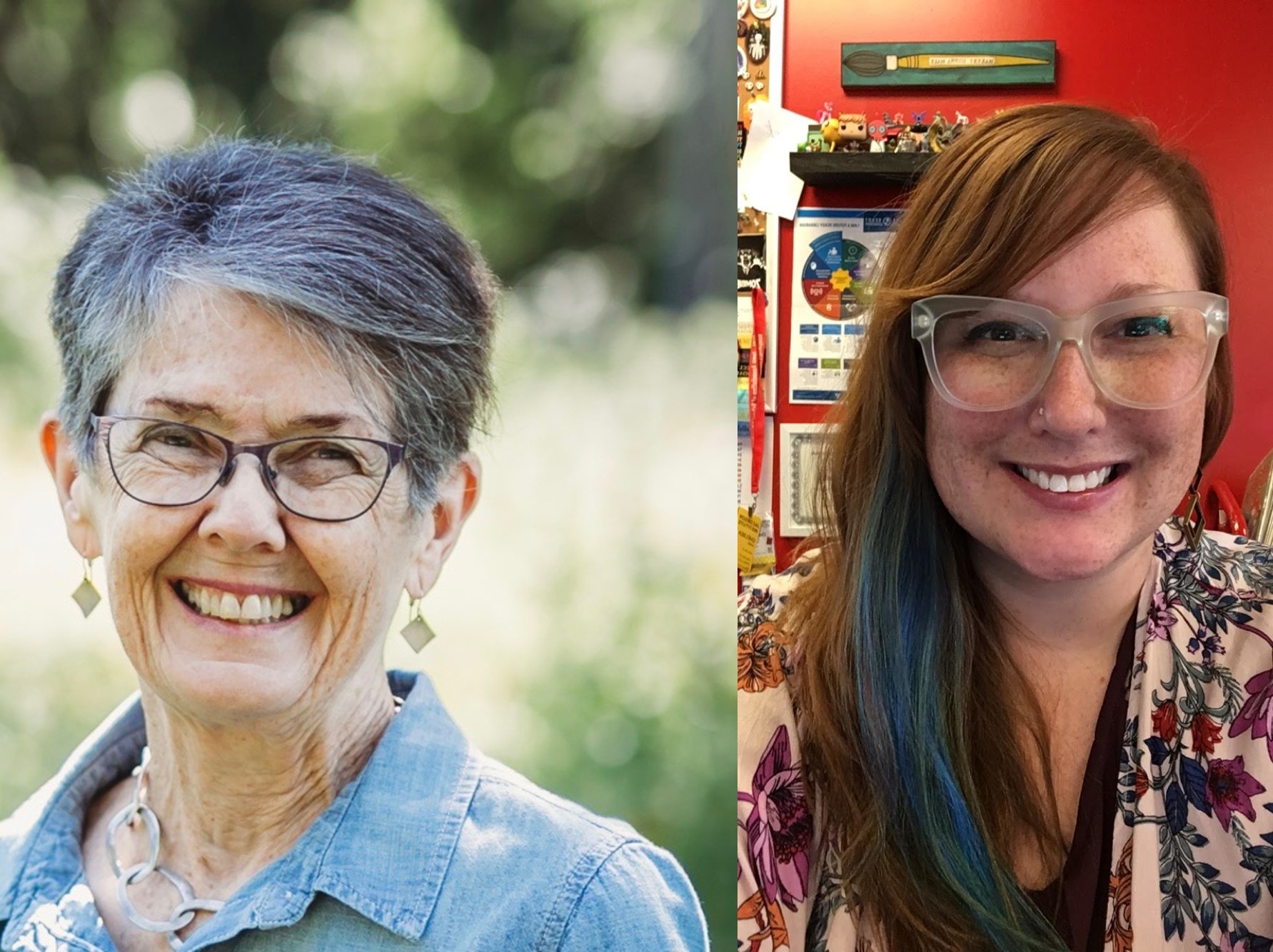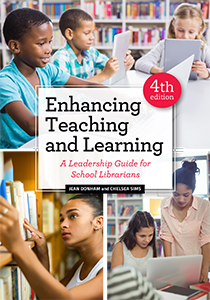An interview with Jean Donham and Chelsea Sims about being a school library leader
For the new fourth edition of Enhancing Teaching and Learning, original author Jean Donham is joined by new co-author Chelsea Sims, a junior high school librarian and 2018 AASL Social Media Superstar for Student Voice. Together they cover every aspect of the school system, paying special attention to what it takes to become a school library leader. We spoke with them recently about how they approached working on the new edition, ways to lead from the middle as a school librarian, and self-care advice for keeping focused and energized.
Congrats on the new edition! Jean, what was it like to bring a new collaborator into the writing process; and Chelsea, how did you approach updating and revising such a classic text?
Jean Donham: I have known Chelsea for a long time — in fact since her undergraduate days at Cornell College. I was her adviser for her MA in School Library Studies and observed that she had much to offer the profession. I have continued to follow her career, and she has shown herself to be an outstanding school librarian and leader among her colleagues in the district as well as the educators with whom she works. As I was considering a new edition of this book, I knew that I wanted to continue to provide a resource that brought scholarship and practice together. Rachel Chance at ALA  Editions asked me if I could think of a practitioner who might join me in meeting that goal, and Chelsea immediately came to mind. The work she does in her school and district is always informed by evidence, and evidence-based practice is a major theme in this edition. The fit was perfect!
Editions asked me if I could think of a practitioner who might join me in meeting that goal, and Chelsea immediately came to mind. The work she does in her school and district is always informed by evidence, and evidence-based practice is a major theme in this edition. The fit was perfect!
Chelsea Sims: Having learned from the previous edition of this textbook — and Jean — when I was in graduate school, I know how important it is to have a comprehensive guide to the profession that ties theory, practice, and aspiration together in one place. It isn’t a textbook on the basics of school librarianship, but on striving for excellence in the field. During the research phase of my graduate program, I also had the experience of collaborating with Jean while writing — and nearly 10 years later, we were still able to speak the same language. I approached updates from the point of view of a new or practicing librarian and asked myself what I would have wanted to know that wasn’t already included in the text. Diversity and inclusion were among the essential elements to expand in this edition, as well as an articulation of the connection between makerspaces, coding, and other recent trends to the mission of school libraries. I have an amazing team of colleagues locally and via social media who helped inform decisions about new topics or perspectives to include, so I hope this new edition will prepare and inspire school librarians as the previous one did for me.
Leadership is front and center in the text, but it can feel daunting to someone new to the profession. What are some words of advice that you wish someone had given you when you were just starting out?
Jean Donham: An important part of leadership is recognizing one's own special skills and knowledge as a school librarian. Confidence in what one knows about information searching, the inquiry process, educational technology, information resources, and literature for young people is key to being able to lead from the middle. Then, developing the behaviors of a colleague, e.g. active listening, putting ideas forward with a willingness to let go or compromise when an idea does not gain traction, and ensuring that everyone is heard. Further, being able to communicate what one knows so that administrators understand the value-add that librarians bring to the collaborative table is an important aspect of gaining respect as a learning leader. Another important aspect of leadership is what is often referred to as the say-do ratio; in other words, ensuring that every commitment or promise made to colleagues is realized by prompt action. I do wish someone had advised me that I did not have to expect myself to be perfect at every aspect of my job from the start!
 You’re pretty blunt about the realities of the job when you write, “School librarians live in a world where they wield little authority.” So what are some things they can do to maximize their leverage and, as you put it, “lead from the middle”?
You’re pretty blunt about the realities of the job when you write, “School librarians live in a world where they wield little authority.” So what are some things they can do to maximize their leverage and, as you put it, “lead from the middle”?
Jean Donham: One important role librarians can play is to keep colleagues apprised of the scholarship of learning and teaching. This is really a traditional role of a librarian — to be an information specialist. By bringing scholarship to the forefront in decision-making the librarian promotes evidence-based practice and encourages reflective thought and discussion among all professionals in the school. In our book, we frequently make reference to evidence-based practice and include some specific advice about how to carry out this role of professional leadership. This calls for librarians to stay well informed in the professional literature of learning, educational and information technology, and literacy, as well as librarianship. Librarians also have expertise in literature for children and youth. Sharing that expertise with colleagues by whatever means (e.g., faculty meeting book talks, newsletters from the library, displays, or targeted email "marketing") is an example of supportive leadership for colleagues. The unique perspectives that librarians bring to their schools include intellectual freedom, students' rights to privacy, issues like leveling for readers and evidence-based applications of technology, the importance of countering not only illiteracy but also a-literacy by encouraging young people to choose freely what they wish to read; these all contribute to a special responsibility to influence through educating their colleagues and proposing positions that may differ from other educators — and doing so without being confrontational, but rather applying principles associated with influence. In the book we include discussion of principles of influence to guide librarians to differentiate between power and influence.
You devote an entire chapter to “technology leadership.” What do you feel this is such an important aspect of being a school librarian?
Chelsea Sims: Librarians have always been on the forefront of ensuring equitable access to ideas and literacy; technology is an avenue for access, and increasingly, a type of literacy itself. In education, technology has become an inseparable element of our daily lives, and one that few educators have been trained to use effectively for instruction. Classroom teachers are often too over-burdened to make informed technology decisions, administrators have many external pressures to juggle, and technicians often lack the classroom perspective necessary to make thoughtful instructional decisions. A librarian’s expertise in evidence-based decision making, collaborative teaching, and providing professional development make her the ideal specialist to take on a leadership role in this arena. Also, realistically, and perhaps a bit cynically, taking on a leadership role in technology is another avenue for ensuring our communities recognize the value of school libraries. Technology is likely to be in the educational spotlight for some time, so the more visible our profession is during those discussions, the better.
Unfortunately, like every librarian, burnout and fatigue are issues that school librarians have to cope with day in and day out. Can you offer some self-care advice for staying energized and focused?
Chelsea Sims:
- Reflect. Our students are what make this job worth it. Reflecting each day on the positive moments you spend with kids — whether it’s an "ah ha!" moment during a research project, finding the perfect book, or listening to one of their silly stories — keep reminding yourself why it’s worth it.
- Connect. Having a passion for school librarianship makes a huge difference; even on my worst days, I know that I love what I do and believe in the reasons I do this work. Connecting with other librarians, however that may look, can help you stay inspired to keep growing and keep going.
- Say no. Sometimes, it really is okay to say no. This goes back to Jean’s advice about the “say-do” ratio — don’t say yes if you can’t reasonably make it happen. Librarians are service-oriented, so it is really hard to not help when someone asks. But realistically, you can’t be everything to everyone and you need to prioritize your tasks. It’s ok. Really. (I’m telling myself this as I tell you!)
Learn more at the ALA Store.
